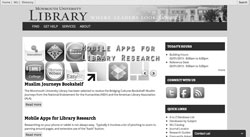On October 16, the first official University task force was charged with the duty of dealing with the academic schedule and framing system. The task force was created by Dr. Thomas S. Pearson, Provost and Vice President of Academic Affairs, and Dr. Donald Smith, Faculty Council member.
Students received emails on October 17 about the start of the task force and its intended purpose. According to the task force creators, academic scheduling and framing have seen issues every year through a wide variety of complications ranging from outside groups, sporting events, issues of space and parking or even semester arrangement. “We overtime noticed that there were a lot of things about the schedule that weren’t always ideal,” said Smith. “In terms of the calendar, many things have come up over time where we have had unusual things that happen.”
The task force members hope to find solutions that can be beneficial to all parts of the University community. “We know that many of our students live off campus and on the shore and are unable to move in until after Labor Day so we cannot begin the semester earlier, and that of course, puts pressure on when we finish the semester,” said Pearson.
The charge, or set of instructions, includes: coming up with two or three possible solutions to the problems at hand, evaluating the pros and cons of each and if possible, reaching a consensus that is agreed upon and effective. “We’re asking the task force to take a broad look at the calendar and make improvements,” said Pearson. “These are the University’s needs and the issues are important so we put together a task force of fifteen well-placed people.”
Dr. Joseph Patten, associate professor and Chair of the Department of Political Science, heads the task force that consists of fifteen diverse members representing all corners of the University.
The participants on the force, carefully handpicked, are as follows: Harvey Allen (assistant professor), Christine Benol (Assistant Vice President of Enrollment and Management/Director of Enrollment Research and Tech Support), Dr. Edward Christensen (Vice President for Information Management), Alex D’ Errico (undergraduate student representative), Dr. George Kapalka (Chair of the Psychological Counseling Department), Mary Anne Nagy (Vice President of Student and Community Services), Susan O’Keefe (Associate Vice President for Academic Administration/Registrar), David Paul (associate professor), Dr. Lynn Romeo (Dean of the School of Education), Richard Scherl (associate professor), Raymond Slamb (graduate student representative), Dr. David Strohmetz (Associate Vice President for Academic and Institutional Assessment), Patricia Swannack (Vice President for Administrative Services) and Kelly Ward (professor).
The ultimate goal of the task force is to brainstorm resourceful solutions that will benefit the University. In doing this, Pearson said the force members were instructed to not only look at what the University has done over the years, but also to look at what other Universities are doing. “I don’t think that anybody has any specific agenda or mindset or plan as to where the task force should go,” said Patten. “People involved come at it with an open mind. The goal is to take a look at issues and see what we do well. There’s no set mindset for any particular change.”
While it remains unrealistic that every single member of the University community can be pleased by the outcome, the task force has accepted the challenge and hopes to seek input from all corners of the University culture. Patten stresses the importance of student involvement in saying, “At the end of the day we’re all here to help students succeed, and it’s critical that students have a lot of input. The task force will see to it that all voices are heard so to create opportunities for all students to share their views.”
Patten encourages students to voice their opinions and says, “The task force wants input from everybody in our campus community – students, faculty, employees, administration- the academic calendar and framing aspects impact everyone and you can’t have a serious discuss without a broad consensus, especially in the early stages.” For anyone looking to submit opinions and commentary about the task force, Patten can be reached via email at jpatten@monmouth.edu.



